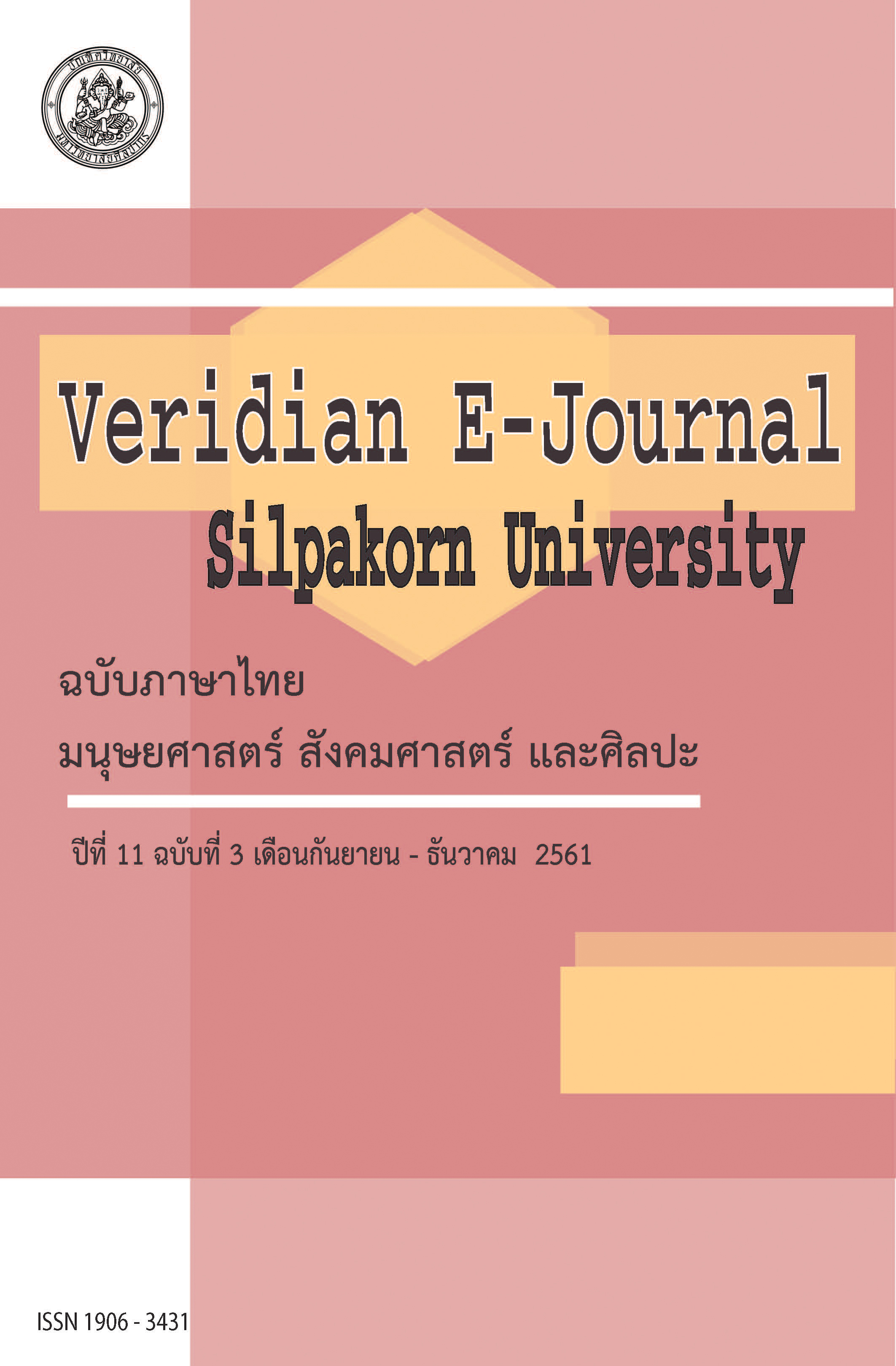การวิเคราะห์องค์ประกอบคุณลักษณะความเป็นพลเมืองดีตามระบอบประชาธิปไตย ของนักเรียนมัธยมศึกษาตอนต้น ในโรงเรียนขยายโอกาสทางการศึกษา (Analysis Of The Factors For Characterizing Democratic Citizenship By Lower Secondary Students At Opportunity Expansion Schools)
Main Article Content
Abstract
การวิจัยครั้งนี้มีวัตถุประสงค์เพื่อศึกษาองค์ประกอบคุณลักษณะความเป็นพลเมืองดีตามระบอบประชาธิปไตย ของนักเรียนมัธยมศึกษาตอนต้น ในโรงเรียนขยายโอกาสทางการศึกษา กลุ่มตัวอย่าง คือ นักเรียนมัธยมศึกษาตอนต้นในโรงเรียนขยายโอกาสทางการศึกษา อำเภอธัญบุรี สังกัดสำนักงานเขตพื้นที่การศึกษาประถมศึกษาปทุมธานี เขต 2 ปีการศึกษา 2560 จำนวน 600 คน เก็บรวบรวมข้อมูลด้วยแบบสอบถามคุณลักษณะความเป็นพลเมืองดีตามระบอบประชาธิปไตย วิเคราะห์ผลการวิจัยโดยการวิเคราะห์องค์ประกอบเชิงสำรวจ (Exploratory Factor Analysis--EFA) สกัดองค์ประกอบด้วยการวิเคราะห์ส่วนประกอบรวม (Component Factor Analysis) ด้วยวิธีองค์ประกอบหลัก (Principle Component Analysis--PC) ใช้เกณฑ์การพิจารณาจำนวนองค์ประกอบจากค่าไอเกนที่มีค่าไอเกนมากกว่า หรือเท่ากับ 1 และใช้การหมุนแกนแบบออธอกอนอล (orthogonal rotation) ด้วยวิธีแวริแมกซ์ (varimax method) เกณฑ์ในการคัดเลือกตัวแปรในแต่ละองค์ประกอบพิจารณาค่าน้ำหนักองค์ประกอบ (factor loading) ที่มีค่ามากกว่าหรือเท่ากับ .40 ซึ่งเป็นตัวแปรที่อยู่ในเกณฑ์ขั้นมีความสำคัญ
ผลการวิจัยพบว่า องค์ประกอบคุณลักษณะความเป็นพลเมืองดีตามระบอบประชาธิปไตยของนักเรียนชั้นมัธยมศึกษาตอนต้น ในโรงเรียนขยายโอกาสทางการศึกษา มีจำนวน 15 องค์ประกอบ อธิบายความแปรปรวนของการวิจัยครั้งนี้ได้ร้อยละ 52.631 ประกอบด้วยองค์ประกอบ 1) ความรับผิดชอบ 2) ทักษะความสามารถ 3) ใฝ่เรียนรู้ 4) จริยธรรม 5) คุณลักษณะด้านการเมืองการปกครองตามระบอบประชาธิปไตย 6) การอนุรักษ์สิ่งแวดล้อม 7) มีจิต-สาธารณะ 8) ความเป็นพลเมืองดีตามประเพณีวัฒนธรรม 9) การเคารพให้เกียรติผู้อื่น 10) การนำหลักธรรมมาใช้ในชีวิต 11) ความสร้างสรรค์ 12) การพึ่งพาตนเอง 13) การดำเนินชีวิตในสังคม 14) บทบาททางสังคมและเศรษฐกิจ 15) การเคารพสิทธิ เสรีภาพ ความเสมอภาค และศักดิ์ศรีความเป็นมนุษย์
In this thesis, the researcher studies factors for characterizing democratic citizenship by lower secondary students at opportunity expansion schools.
The sample population consisted of 600 lower secondary students enrolled in the academic year 2017 at opportunity expansion schools in Thanyaburi district under the jurisdiction of Pathum Thani Educational Service Area Office Two. A questionnaire was used to collect data concerning the charactristics of democratic citizenship.
Data were analyzed through the use of exploratory factor analysis (EFA). In addition, applying principal component analysis (PCA), the researcher extracted componential factors. The criterion for retention of factors was to select those factors whose eigenvalue was greater than or equal to 1 (≥1). Verimax rotation was then utilized to eliminate all but a few factors concomitant with appropriately rotating the orthogonal basis. The criterion for the selection of variables for each factor thence became whether loading factors showed values greater than or equal to (≥) 0.40. These factors were thereupon selected as the important variables.
Findings are as follows:
fifteen factors were found to be considered as the characteristics of democratic citizenship by the students. These factors were explanatory of variance at 52.631 percent.
The factors were: (1) responsibility; (2) skills; (3) seeking knowledge; (4) morality; (5) the characteristics of democratic politics in government; (6) conservation of the environment; (7) having a public mind; (8) traditional and cultural citizenship; (9) showing respect for others; (10) showing leadership in bringing to bear dhamma principles on life; (11) creativity; (12) self-reliance; (13) living a life in society; (14) social and economic roles; (15) showing respect for rights, freedom, equality, and human dignity.
